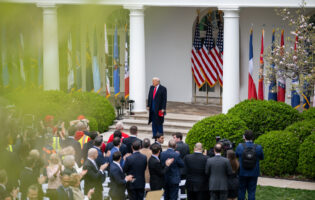
5G Decision Time in Germany

Yixiang Xu
China Fellow; Program Officer, Geoeconomics
Yixiang Xu is the China Fellow and Program Officer, Geoeconomics at AGI, leading the Institute’s work on U.S. and German relations with China. He has written extensively on Sino-EU and Sino-German relations, transatlantic cooperation on China policy, Sino-U.S. great power competition, China's Belt-and-Road Initiative and its implications for Germany and the U.S., Chinese engagement in Central and Eastern Europe, foreign investment screening, EU and U.S. strategies for global infrastructure investment, 5G supply chain and infrastructure security, and the future of Artificial Intelligence. His written contributions have been published by institutes including The Chinese Academy of Social Sciences, The United States Institute of Peace, and The Asia Society's Center for U.S.-China Relations. He has spoken on China's role in transatlantic relations at various seminars and international conferences in China, Germany, and the U.S.
Mr. Xu received his MA in International Political Economy from The Josef Korbel School of International Studies at The University of Denver and his BA in Linguistics and Classics from The University of Pittsburgh. He is an alumnus of the Bucerius Summer School on Global Governance, the Global Bridges European-American Young Leaders Conference, and the Brussels Forum's Young Professionals Summit. Mr. Xu also studied in China, Germany, Israel, Italy, and the UK and speaks Mandarin Chinese, German, and Russian.
__
Early in the week, German chancellor Angela Merkel sought to further delay a decision on whether to allow Chinese telecommunications company Huawei to participate in Germany’s 5G infrastructure buildup. Her own conservative CDU/CSU party was divided on support for a proposal from her government’s Social Democrat (SPD) junior coalition partners that, if approved, could effectively shut out the Chinese technology giant from Germany’s 5G networks.
The chancellor made it clear that she still sees 5G network development as a primarily economic issue and is thus unwilling to provoke the ire of China, one of Germany’s top trade and investment partners. Germany’s interior minister Horst Seehofer separately argued that a timely rollout of 5G in the country could not happen with out Huawei. Markus Söder, a member of the CSU and Bavaria’s minister-president, even claimed that Germany’s choice of 5G technology is limited between Chinese and U.S. suppliers. (Mr. Söder’s claim is definitely ill-informed as the 5G market is dominated by Huawei, Nokia, and Ericsson.)
These arguments reflect the German government’s priorities of managing the country’s 5G rollout, which increasingly looks to be cost first, speed second, and security last.
These arguments reflect the German government’s priorities of managing the country’s 5G rollout, which increasingly looks to be cost first, speed second, and security last. Huawei already provides 45 percent of Germany’s 4G base stations and is a leading supplier to German phone companies. Without the U.S. campaign to exclude Huawei from Europe’s next generation network infrastructure, network security concerns would have been brushed aside. In other words, business as usual.
Striving for low costs and fast deployment may be enshrined commandments for businesses, but the German government should not rush to their defense without first examining their merits and wider societal impact. Using Nokia or Ericsson equipment could push up the cost for 5G buildup, and service providers would have to adapt their profit structure accordingly. But if Deutsche Telekom’s subsidiary T-Mobile can build 5G networks in the U.S. without Huawei equipment and still maintain a positive profit projection, the same could be done in Germany. Actually, some off the biggest 5G expenditure in Germany comes from record spectrum auction prices, which service providers planned to offset with low equipment costs.
In a speech in Munich, Thierry Breton, the European Commissioner for Internal Market and Services, dismissed claims that relying on European companies to build 5G networks would result in delays. 5G infrastructure construction has been underway in major urban centers in Germany, many of which were scheduled to receive 5G services this year. At the moment, it is rather the absence of a clear government position on Huawei that’s delaying deployment and holding back investment on further 5G implementation.
Wedged between U.S. demands and a Chinese threat of retaliation, Chancellor Merkel and many other leaders in Europe are trying to chart their own course of a balanced act.
Germany is under increased U.S. pressure and Washington could potentially restrict intelligence sharing with the country if Huawei equipment is built into German 5G networks. Wedged between U.S. demands and a Chinese threat of retaliation, Chancellor Merkel and many other leaders in Europe are trying to chart their own course of a balancing act. French president Emmanuel Macron emphasizes French “sovereignty” over 5G decisions while Austrian chancellor Sebastian Kurz wants to maintain Austrian “technology neutrality.” As European countries adopt various positions and strategies, it seems difficult, if not unlikely, for the upcoming March EU summit to produce any consensus that could have decisive effects on Germany’s internal 5G debate. Nor will the EU’s 5G security “toolbox,” due to be published later in the month, be binding for the German government.
There won’t be much success in seeking shelter under the cover of a European solution if Germany isn’t prepared to lead that multilateral process by making some hard decisions. Chancellor Merkel’s preferred certify-and-monitor approach was an attempt to solve a political dilemma. But it doesn’t go far enough to address some fundamental issues, including fair market competition, technological competitiveness, or ongoing security concerns stemming from long-term geographic rivalry, that have put Germany in such a dilemma in the first place. True independence of a German 5G policy needs to come from a thorough examination of its concerns and coming up with a plan to shape, and not just accept, its options.









